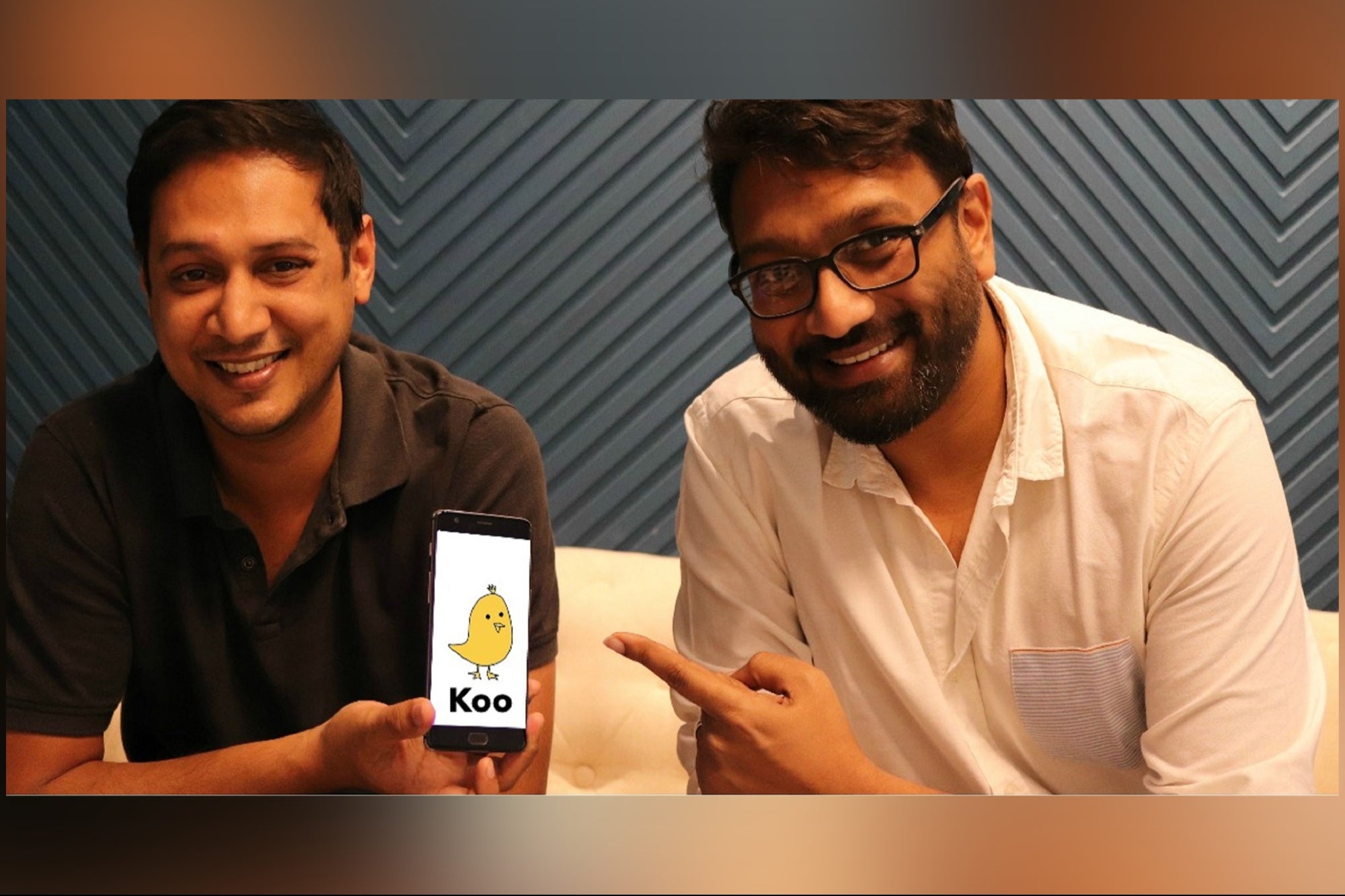Baby Koo Pecks At Teenage Twitter More the 10-month old Indian social media platform is compared with 15-year-old Twitter, people are understanding our platform faster: Mayank Bidawatka, co-founder, Koo
You're reading Entrepreneur India, an international franchise of Entrepreneur Media.

"Google isn't the first search engine. It was the 17th search engine," said Mayank Bidawakta, co-founder of Koo, when asked about his reaction on people calling Koo an alternative to Twitter. In the first week of February, #BanTwitter was trending on Twitter! The Jack Dorsey-led popular microblogging site was at loggerheads with the Indian government for not removing certain accounts/posts in the backdrop of the farmers' protests.
It was during this time, several government officials and Union ministers signed up on Koo, a vernacular microblogging website, and asked people to follow them on the Indian social media platform for latest updates. Following this, from celebrities, journalists to common man, many flocked to this platform, to network and test how the indigenious microblogging platform is. Currently, the app boasts of over 4.3 million downloads and is seeing a 50x-60x growth on the Web.
In an interaction with Entrepreneur India, Bidawakta shared why there is a need for an Indian microblogging platform and his goals.
What is Koo?
The Bengaluru-bsaed app was founded in March 2020 by Aprameya Radhakrishna and Bidawatka as an inclusive microblogging platform in Indian languages where people from across different regions in India can express themselves in their mother tongue. Koo provides a voice to Indians who prefer Indian languages.
Bidawakta said at the moment most users are using microblogging platforms in English because it was made keeping global audience in mind. Bidawakta, a serial entrepreneur who has been part of the foundation and coreteam at redBus, The Media Ant, Goodbox and invested in Vogo, TapChief and Yolo Bus to name a few, said the scale at which India's language diversity exists, no other country can match. There are thousands of languages with different dialects and over 50 languages with over a million users.
"We need to Indianize microblogging for a larger part of India to be a part of it and that is Koo's mission," he added.
"Let's get India ahead and let the voice of India and Indians be heard." Currently, Koo is available in Hindi, English, Kannada, Tamil, Telugu, Marathi and other regional languages will be available soon.
Koo claims that just 10 per cent of India speaks English, whereas 90 per cent prefer Indian languages. There's no place on the Internet for them to express themselves in their native language and discover others from the same community.
The app has won the AtmaNirbhar App Challenge and has been mentioned by the Prime Minister Narendra Modi and Piyush Goyal, Union Minister of Railways; Commerce & Industry.
Twitter Vs Koo
Bidawakta, who himself is an active Twitter user, said he wished he had created Twitter and doesn't feel offended when people tag Koo as an alternative of Twitter, rather he says that it helps people understand about the platform fast. However, he did say people who compare Twitter with Koo are naive. "You are trying to compare something that is there around for 15 years with something that is ten months old," he added.
When you login on Koo after selecting a language, the instructions on the app will be on the selected language unlike Twitter which only supports English. The platform enables regular contributors to be discovered by people of his own community.
Bidawakta said unlike Twitter, Koo provides audio creation and video creation options for content creators, as he believes for the next one billion users who never had access to the Internet, using a keyboard to type will be tedious.
Koo has recently raised $4.1 million led by 3One4 Capital and other existing investors.
Cater to India
Bidawakta always had the goal of creating a product that will be used by the entire country, from the Prime Minister of India, Bollywood stars to cricket personalities. As per Bidawakta, aspirational India wants to connect with the people that they look upto and that platform has not been created yet.
"There is no platform for me to connect with the Prime Minister of India in my language or connect with the chief minister of my state," he questions.
Koo's main aim is to bridge the language divide and help people understand each others' views without language constraint.
When asked about whether Koo will go global, Bidawakta said India has over 500 million Internet users and in coming years, India's Internet users will surpass America's population. He said that global companies are coming to India to register a big spike in growth.
"Why aren't we building for India? India is a massive market, you have enough companies that have shown if you build for India, you can create some of the largest companies in the world," he reasoned. He said in future, when Koo will thrive on cutting edge technology and identify problem statements in the global market, Koo will go global.
Future features
Bidawakta said moving ahead, the company will try to solve interlanguage communication, which will bring people from different communities together. The company will be looking at allowing users to post longer "koos' in the form of sequence and schedule your koos. The Bengaluru-based company will also look at introducing Koo live and live chat rooms.










